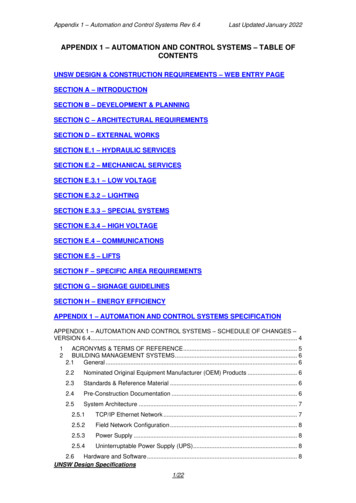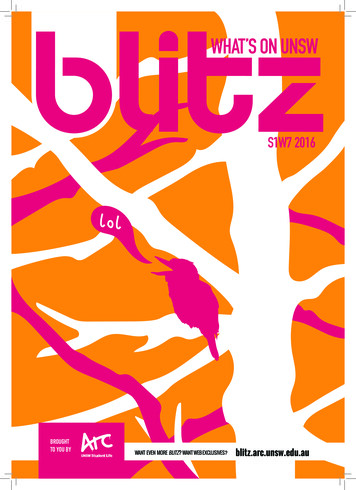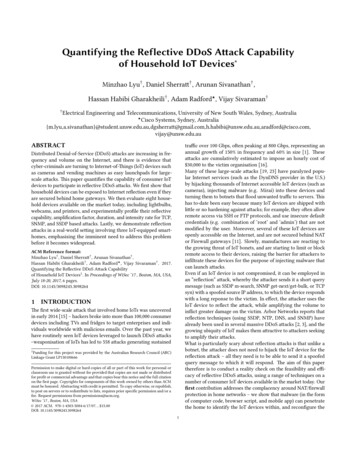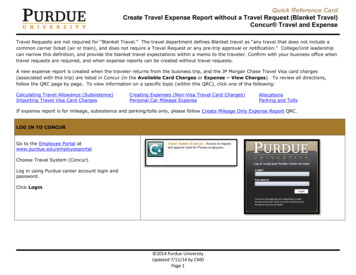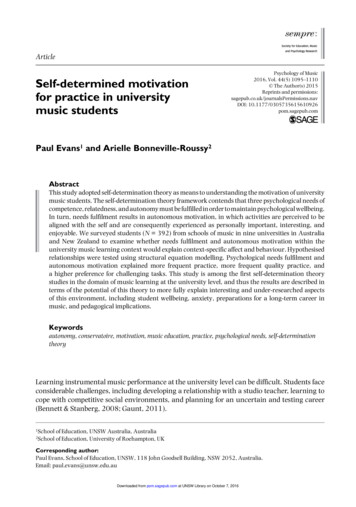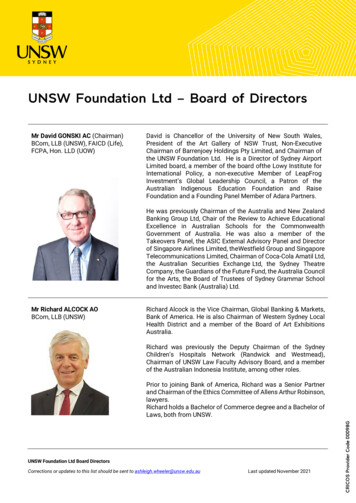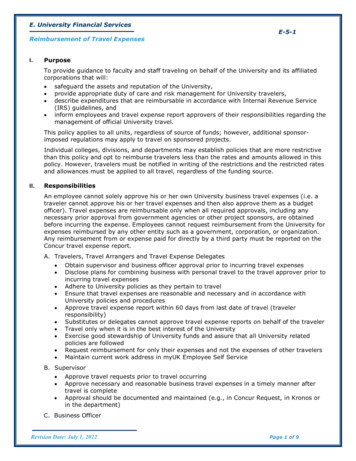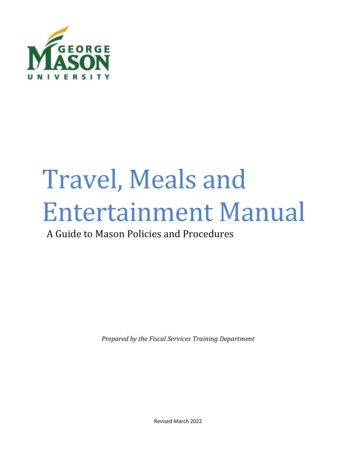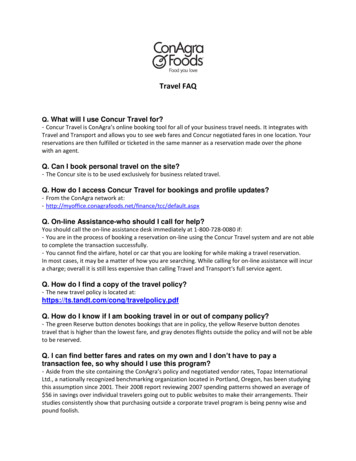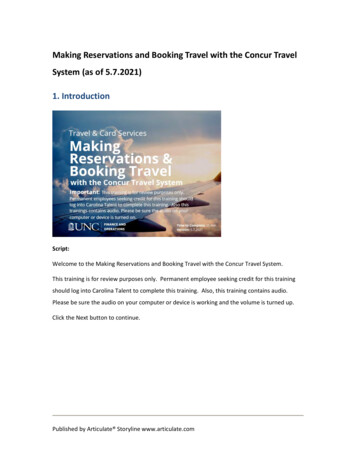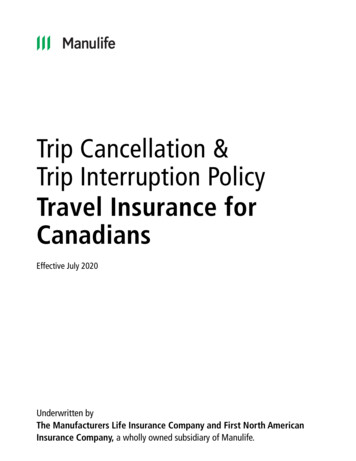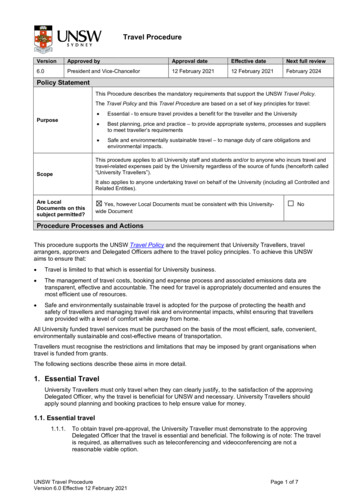
Transcription
Travel ProcedureVersionApproved byApproval dateEffective dateNext full review6.0President and Vice-Chancellor12 February 202112 February 2021February 2024Policy StatementThis Procedure describes the mandatory requirements that support the UNSW Travel Policy.The Travel Policy and this Travel Procedure are based on a set of key principles for travel:Purpose Essential - to ensure travel provides a benefit for the traveller and the University Best planning, price and practice – to provide appropriate systems, processes and suppliersto meet traveller’s requirements Safe and environmentally sustainable travel – to manage duty of care obligations andenvironmental impacts.This procedure applies to all University staff and students and/or to anyone who incurs travel andtravel-related expenses paid by the University regardless of the source of funds (henceforth called“University Travellers”).ScopeIt also applies to anyone undertaking travel on behalf of the University (including all Controlled andRelated Entities).Are LocalDocuments on thissubject permitted? Yes, however Local Documents must be consistent with this Universitywide Document NoProcedure Processes and ActionsThis procedure supports the UNSW Travel Policy and the requirement that University Travellers, travelarrangers, approvers and Delegated Officers adhere to the travel policy principles. To achieve this UNSWaims to ensure that: Travel is limited to that which is essential for University business. The management of travel costs, booking and expense process and associated emissions data aretransparent, effective and accountable. The need for travel is appropriately documented and ensures themost efficient use of resources. Safe and environmentally sustainable travel is adopted for the purpose of protecting the health andsafety of travellers and managing travel risk and environmental impacts, whilst ensuring that travellersare provided with a level of comfort while away from home.All University funded travel services must be purchased on the basis of the most efficient, safe, convenient,environmentally sustainable and cost-effective means of transportation.Travellers must recognise the restrictions and limitations that may be imposed by grant organisations whentravel is funded from grants.The following sections describe these aims in more detail.1. Essential TravelUniversity Travellers must only travel when they can clearly justify, to the satisfaction of the approvingDelegated Officer, why the travel is beneficial for UNSW and necessary. University Travellers shouldapply sound planning and booking practices to help ensure value for money.1.1. Essential travel1.1.1.To obtain travel pre-approval, the University Traveller must demonstrate to the approvingDelegated Officer that the travel is essential and beneficial. The following is of note: The travelis required, as alternatives such as teleconferencing and videoconferencing are not areasonable viable option.UNSW Travel ProcedureVersion 6.0 Effective 12 February 2021Page 1 of 7
1.1.2.The required travel is within a cost centre budget and beneficial for the functions of theUniversity.1.1.3.The business component of the travel represents more than 50% of the total travel duration. Ifnot refer to Section 3.1.1. Private contribution to flights’ cost, and leave as appropriate(annual, long service or leave without pay) has been booked to cover any weekdays that areclassified as private days.1.1.4.All requests for Travel are completed in the Pre-Trip Approval/Information (PTA) system foraudit purposes. Refer to Section 1.2.1.2. Pre-Trip Approval/Information1.2.1All proposed travel is to be recorded in the University’s Pre-Trip Approval/Information system(PTA).1.2.2The PTA will capture the preliminary information for the purposes of recordkeeping, auditprocesses and helping the University discharge its obligation to provide duty of care and safety.In particular, the justification that travel is essential.1.2.3Where required the PTA can be prompted to seek authority from the Delegated Officer. TheDelegated Officer is usually the Supervisor or Line Manager (or someone of higher delegationthan the traveller). For Domestic bookings the PTA will send a notification to the DelegatedOfficer. International bookings will require approval from the Delegated Officer before a bookingcan be made.1.2.4Travel should be planned in advance and last-minute travel is to be avoided where possible tominimise costs. Generally, airfares and hotel rates are more expensive closer to the day ofdeparture. Availability may also be limited, especially where a trip coincides with key events,such as conferences, large public events, or peak travel periods such as the European summer.1.2.5Travellers and where required, Delegated Officers (Approvers) are to ensure that: Travel is essential and for official University business Travel and associated costs are relevant, comply with UNSW Policy and are within budgetconstraints The cost to the University is minimised Travel to restricted/high risk destinations is approved by the Director, Risk Management.1.3. Travel Management Company (TMC)All travel must be booked through the University’s approved TMC – Business Travel by STA.Travellers should not book outside of the TMC as this creates audit, reporting, compliance and duty ofcare issues.The TMC offers 2 booking solutions:1. Online Booking Tool (OBT) – this should be used for domestic bookings2. Consultants – for international bookings, complex domestic bookings and generalinformation.The TMC can book: Air Accommodation Car hire Rail/Ferry transfersThe TMC can assist with: General travel information and requirements Visa processing and other ancillary requirementsUNSW Travel ProcedureVersion 6.0 Effective 12 February 2021Page 2 of 7
1.4. Travel Expenses and Class of TravelExpectations and requirements related to travel expenses, class of travel, ground transport, meals,incidentals, lounge memberships, entertainment and reasonable travel expenditure are all set out inthe UNSW Business Expense Procedure.1.5. Insurance1.5.1.Various levels of travel insurance exist for travellers, dependent upon: Length of travel University Traveller e.g. staff or student Whether private travel is combined with business travel Excess cover for rental vehiclesFor full details please review information at . Paying for Travel1.6.1Payment of air and accommodation facilitated through the TMC booking process will beautomated through a central payment process.1.6.2Where it is necessary to pay for air and accommodation directly, e.g. a last-minute change inarrangements or due to conflict or disaster directly affecting a destination, the UniversityTraveller should use:(a) a UNSW credit card with reimbursement through NS Financial systems, or(b) pay for it independently and seek reimbursement. Reimbursements will only be paid ifthey are in line with the Business Expense Policy and Business Expense Procedure.1.6.3Payment and reimbursement of travel related expenses, such as meals while travelling, taxis,incidentals or in the case of 1.6.2(b), can be made in line with the Business Expense Policyand Business Expense Procedure, with the following processes: Travel Allowances (Per Diems) can be paid in advance and do not require reconciliation oracquittal – complete the TR2 form. Travel Cash Advance for business expenses (e.g. where credit cards may not beaccepted) – complete the TR3 form. Reconciliation of Cash Advances. This may require repayment of any unused portions of aCash Advance must be made to UNSW - complete the TR4 form. Note: students are not eligible to Travel Allowances (Per Diems) but with agreement of theHead of School may claim reimbursement of actual expenditure upon production ofreceipts subject to limits outlined in the Business Expense Procedure,1.7. External grantsTravel funded through external grant arrangements must comply with the terms and conditions of thegrant. Where there is an inconsistency between the terms of the external grant and the University’sTravel Policy, Travel Procedure and Business Expense Procedure, the terms of the external grant,with respect to travel, shall prevail.To the extent that Fringe Benefits Tax (FBT) liability must be eliminated (see Section 1.8) this UNSWTravel Procedure should be followed. If the grant is silent on travel terms, the Travel Policy, TravelProcedure and Business Expense Procedure applies.1.8. FBT LiabilityAny FBT liability that arises as a result of a travel event (either funded through external grants orinternally) must be eliminated by the University Traveller through:a. the reduction of private travel days to less than 50% of the trip durationb. flight cost contribution as per the method in Section 3.1.1 orUNSW Travel ProcedureVersion 6.0 Effective 12 February 2021Page 3 of 7
c.FBT repayment as per the method in 3.1.1.1.9. Telephony & DataTelephony and data roaming charges must be considered when travelling. Pay-as-you-go roaming isdisallowed, while travellers may pre-arrange international plans/data packs on their Australian sims.The Business Expense Procedure provides information. Travellers are to comply with the adviceprovided at the following .edu.au/staff/mobile/mobile data precautions.html.1.10.Travel diaryUnder Payroll Tax and Fringe Benefits Tax requirements, a travel diary is needed for any travel 6nights or longer, away from home and must be retained for 5 years.1.10.1. Any trip that is 6 nights or longer away from home needs to:a. be booked with the University’s approved travel management company - Business Travelby STAb. have a Travel diary completed in the Pre-Trip Approval system (or using the Travel Diary TR5 form)1.10.2. The University Traveller must complete a Travel Diary for the:a. pre-trip – outlining key trip information, together with any conference itinerary, externalinvitation or supporting brochureb. post-trip – update their trip details and submit it to their Delegated Officer within 10business days of returning from the trip.2. SafetyUniversity travel should only be undertaken when it is safe to do so.2.1. Safety and wellbeingThe University Traveller and the approving Delegated Officer must take reasonable steps to ensurethe safety and wellbeing of everyone travelling on University business.2.2. High risk countryThe University will not require University Travellers to travel to a high-risk country on Universitybusiness. A high-risk country is determined based on the ratings provided by Department of ForeignAffairs and Trade (DFAT) or International SOS (ISOS).All requests for travel to a high-risk country must be approved by the Director, Risk & SafetyManagement prior to any bookings or travel.Any travel undertaken to a high-risk country, will not be covered by the University’s travel insurance,unless appropriate approval from Director, Risk & Safety Management has been granted.2.3. High risk ActivityTravellers and Delegated Officers should check whether any high-risk activities are covered by theUniversity’s Travel Insurance.Travellers and Delegated Officers should also refer toHS406 Fieldwork Guideline, HS917 Fieldwork Procedure, and HS019 Fieldwork Risk ManagementChecklist.UNSW Travel ProcedureVersion 6.0 Effective 12 February 2021Page 4 of 7
3. Additional Requirements3.1. Private Travel in conjunction with Business Travel3.1.1.Private contribution to flights’ cost: The University Traveller (including students whentravelling as an Employee) must privately pay for the private portion of the total flights’ cost fora trip, whenever the private component of the travel is proposed to be 50% or more of theduration of the entire trip.In this latter scenario, the University Traveller must do one of the following:a. reduce the private component to be less than 50% of the duration of the entire trip, orb. pay the University’s TMC for the entire trip privately themselves and then seekreimbursement of the business component (50% of the total airfares) from the University,orc.pay the private component of the flights’ cost (50% of the total airfares) directly to theUniversity’s TMC at the time of booking, ord. if a trip change happens post-departure, repay the private portion of the flights’ cost to theUniversity after completing the trip.3.1.2The University does not reimburse travel expenses of an accompanying traveller unlessspecified in an employment contract or expressly approved by the Vice-Chancellor.3.2. Departure, route and stopovers3.2.1.Flight and route: When travelling on University business, University Travellers must:a. undertake the most direct and economical route from the University to the location of theirUniversity businessb. return back via the same most direct and economical routec.not direct the choice of a flight or route based on their:i)private preference of the route, orii)private preference of an airline provider, oriii)private travel needs.3.3. Usage of Private Vehicles3.3.1.Usage of Private vehicles is discouraged. Travellers who chose to use a private vehicle shouldcomplete the Travel MV1 (Approval to Use a Private Vehicle) and a MV2 form (Private VehicleMileage Claim) to record their mileage for each claim.3.3.2.The University does not accept liability for damage, loss or injury arising from the use of aprivate vehicle on University business.3.4. Student Travel3.4.1The procedure applies to all student travel for approved UNSW related activities, domesticand international, such as exchange, fieldwork, practicum, short course, conferences, studytour, volunteer placement and internship undertaken while studying at UNSW. This includestravel for Arc@UNSW activities, specifically those under a Student Community andDevelopment Grant, and activities included in a student’s Australian Higher EducationGraduate Statement (AHEGS).3.4.2All students travelling overseas should refer to the Students Travelling Overseas – How toPrepare for Departure before making arrangements to travel.3.4.3Research students should also consult the Postgraduate Research Student Support (PRSS)Travel Information at the UNSW Research Gateway http://research.unsw.edu.au.UNSW Travel ProcedureVersion 6.0 Effective 12 February 2021Page 5 of 7
AccountabilitiesResponsible OfficerDirector, Procure to PayContact OfficerTravel Service ManagerSupporting InformationLegislative ComplianceThis Procedure supports the University’s compliance with the following legislation:NilParent Document (Policy)Travel PolicySupporting DocumentsNilHS406 Fieldwork GuidelineHS917 Fieldwork ProcedureHS019 Fieldwork Risk Management ChecklistConflict of Interest PolicyGifts and Benefits PolicyRelated DocumentsGifts and Benefits ProcedureRegister of DelegationsCredit Card PolicyBusiness Expense PolicyBusiness Expense ProcedureTravel MV1 (Approval to Use a Private Vehicle)MV2 form (Private Vehicle Mileage Claim)Superseded DocumentsTravel Procedure, v5.1File Number2017/21851Definitions and AcronymsDelegated OfficerThe University Traveller’s supervisor as noted in the University’s Human ResourcestructureFBTFringe Benefits Tax as per the definition of the Australian Tax OfficePTAPre Trip Approval. Workflow system which contains information on the UniversityTraveller’s intention to travelTravel Management Company.TMCThe University’s TMC is Business Travel by STAUniversity TravellerUniversity staff and students and/or to anyone who incurs travel and travel-relatedexpenses paid by the University regardless of the source of fundsRevision HistoryVersionApproved byApproval dateEffective dateSections modified1.0Chief Operating Officer31 October 20081 November 2008New document1.1Director of Procurement3 November3 November2.7.21.2Director of Procurement16 February 200916 February 20092.7UNSW Travel ProcedureVersion 6.0 Effective 12 February 2021Page 6 of 7
2.0Executive Director, Financeand Operations6 November 20091 January 2010Full review2.1Executive Director, Financeand Operations7 July 20101 July 2010Updated travel allowances2.2Executive Director, Financeand Operations19 January 20111 January 20114.1.1, 4.1.2, 4.3, 5.3, 6.1, add6.52.3Executive Director, Financeand Operations13 July 20111 July 2011Appendix 12.4Administrative update byHead, Governance Support8 March 20128 March 2012Links updated in Section 2.1and 2.33.0Vice-President, Finance andOperations7 June 20121 June 2012Full review3.1Vice-President, Finance andOperations20 August 20121 July 20124.2, 5.2, 5.3, Appendix 13.2Vice-President, Finance andOperations19 July 20131 July 20134.1, 4.1.2, 4.1.3, 4.1.4, 4.2, 5.3,Appendix 14.0Vice-President, Finance andOperations2 October 20142 October 20144.2Vice-President, Finance andOperations22 July 201522 July 20154.3Vice-President, Finance andOperations21 July 201625 July 20164.4Vice President, Finance andOperationsFull reviewInclusion of International SOS(iSOS)Preferred Suppliers.17 August 201717 August 2017Updated ATO travel allowancerates 2015-16Updated ATO travel allowancerates 2016/2017 and updatesto new Finance website.Updated sections 1.2 and 2, toreflect change in responsibilityfrom Deputy Vice Chancellor(Education) and Deputy- ViceChancellor (Academic), toDirector, Risk Management.Updated ATO travel allowancerates 2017/2018.4.5Vice President, Finance andOperations4 December 20174 December 2017Updated to link to newBusiness Expense Policy andProcedure and removeduplications.5.0President and ViceChancellor24 October 201814 November2018Full review and release for theTravel Program Pilot Phase5.1President and ViceChancellor3 December 2018Minor amendments section1.5.3; 2.2; 2.2.1 and 4.1.1 andlinks updated prior to UNSWwide release6.0President and ViceChancellor12 February 2021Review with amendments tomove essential travel tosection 1 (for emphasis) andincorporate environmentalsustainability.UNSW Travel ProcedureVersion 6.0 Effective 12 February 202128 November 201812 February 2021Page 7 of 7
All requests for travel to a high-risk country must be approved by the Director, Risk & Safety Management prior to any bookings or travel. Any travel undertaken to a high-risk country, will not be covered by the University's travel insurance, unless appropriate approval from Director, Risk & Safety Management has been granted. 2.3.
